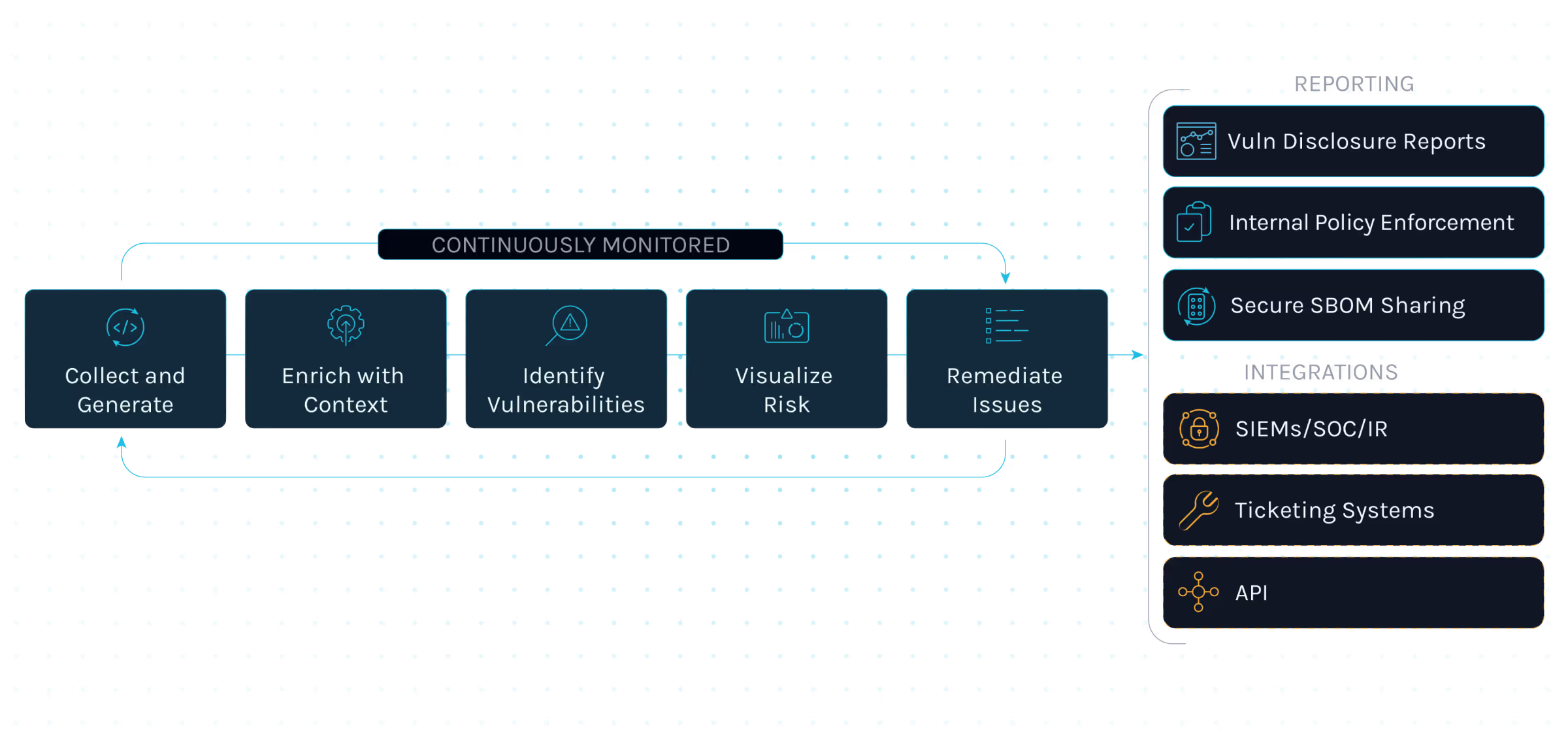SBOMs: More Than a Compliance Checkbox
A Software Bill of Materials (SBOM) is a comprehensive list of software components, including open-source and proprietary code.
Generating SBOMs, once a manual task, is now an automated and continuous process essential for today's regulatory and security needs.
Key SBOM Takeaways:
Deliver visibility into all software components, including vulnerabilities, licenses, and origins.
Help teams quickly assess exposure during supply chain attacks and streamline incident response.
Benefit multiple stakeholders, including, security, engineering, compliance, and procurement.
Improve software risk reduction with less false positives and stronger vulnerability prioritization.

Building the Foundation of Software Supply Chain Security
SBOMs are now critical for organizations across industries. They help:
Satisfy mandates like U.S. Executive Order 14028, NTIA guidelines, and global standards.
Quickly assess which applications are impacted by vulnerabilities (e.g., Log4j, OpenSSL).
Require SBOMs from vendors to verify third-party software integrity.
Provide customers, partners, and regulators with transparency and assurance.
The Challenges of SBOM Generation and Management
Despite their importance, many organizations struggle with SBOM generation because:
- Manual Processes
One-time SBOMs are incomplete and quickly outdated
- Complex Formats
Multiple standards (SPDX, CycloneDX) require expertise.
- Dynamic Environments
Cloud-native, containerized, and CI/CD workflows demand continuous updates.
How Manifest Automates SBOM Generation
Start generating high-fidelity SBOMs with Manifest
With Manifest, SBOMs become a living asset powering Platform, Product Security, Supplier Risk, and AI Risk. Our customers are enabled to secure the entire AI and software supply chain.
FAQs
SBOM (Software Bill of Materials) management refers to the process of generating, validating, updating, and sharing an inventory of all software components in a product. Software is the only thing we buy that we don’t have a list of ingredients or safety tests for. SBOMs enable visibility, vulnerability detection, and compliance across the software supply chain. With proper SBOM management, organizations can identify risks before they affect customers or operations.
Manifest Product Security offers a real-time view into your entire software supply chain, enabling early detection of vulnerabilities, license violations, and misconfigurations. It integrates SBOM and VEX support, automates exposure reports, and helps streamline incident response, making your software more secure without slowing development.
VEX (Vulnerability Exploitability Exchange) documents provide context about whether a known vulnerability in a component actually affects your software. Manifest allows you to generate VEX in CSAF or OpenVEX formats and ingest VEX from third-party vendors, helping you prioritize what truly needs remediation.
Manifest integrates at multiple stages of the SDLC to provide real-time risk visibility and policy enforcement. We recommend customers implement Manifest at the start of the SDLC, when open-source software (OSS) and third-party software are being evaluated for use. Manifest enables developers to upload SBOMs, receive alerts on vulnerable components, and assess open-source code before use, supporting secure development without sacrificing speed.
Manifest automates SBOM validation, generates VEX, and allows secure sharing of artifacts with regulators and partners. This simplifies compliance with standards from CISA, NTIA, FDA, the EU and other regulatory bodies, reducing manual effort and demonstrating maturity in your software assurance program.